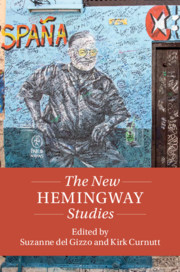Book contents
- The New Hemingway Studies
- Twenty-First-Century Critical Revisions
- The New Hemingway Studies
- Copyright page
- Contents
- Contributors
- Introduction Hemingway in the New Millennium
- Part I The Textual Hemingway
- Part II Identities
- Chapter 6 Family Dynamics and Redefinitions of “Papa”-hood
- Chapter 7 Hemingway and Pleasure
- Chapter 8 Trauma Studies
- Chapter 9 Hemingway and Queer Studies
- Chapter 10 Hemingway, Race(ism), and Criticism
- Chapter 11 Still Famous after All These Years
- Part III Global Engagements
- Works Cited
- Index
Chapter 7 - Hemingway and Pleasure
from Part II - Identities
Published online by Cambridge University Press: 30 August 2020
- The New Hemingway Studies
- Twenty-First-Century Critical Revisions
- The New Hemingway Studies
- Copyright page
- Contents
- Contributors
- Introduction Hemingway in the New Millennium
- Part I The Textual Hemingway
- Part II Identities
- Chapter 6 Family Dynamics and Redefinitions of “Papa”-hood
- Chapter 7 Hemingway and Pleasure
- Chapter 8 Trauma Studies
- Chapter 9 Hemingway and Queer Studies
- Chapter 10 Hemingway, Race(ism), and Criticism
- Chapter 11 Still Famous after All These Years
- Part III Global Engagements
- Works Cited
- Index
Summary
In “Hemingway and Pleasure,” David Wyatt (re)introduces readers to Hemingway as a sensualist. Wyatt suggests that Hemingway’s deep, if complicated, appreciation of pleasure and sensuality has been occluded by years of criticism that focus the moral implications of pleasure and the idea that Hemingway’s stoicism and sense of discipline put him at odds with the release of enjoyment – basically the theme as iterated in A Moveable Feast: “Hunger is Good Discipline.” Wyatt argues that contemporary culture’s fascination with artisanal food and drink and with raw, natural experiences have provided a path to recovering Hemingway’s sense of pleasure. He canvasses recent popular and scholarly works that celebrate Hemingway’s love of food, drink, sex, art, and good living in general as he reads specific passages from Hemingway’s work to demonstrate the author’s consistent interest in these experiences. Critics examined include Nicole J. Camastra and Hilary Kovar Justice, among others. Wyatt finally argues that, for Hemingway, pleasure challenges us to be fully present and to have the desire of pleasure renewed in the face of the certainty that all pleasure must end.
Keywords
- Type
- Chapter
- Information
- The New Hemingway Studies , pp. 115 - 129Publisher: Cambridge University PressPrint publication year: 2020

